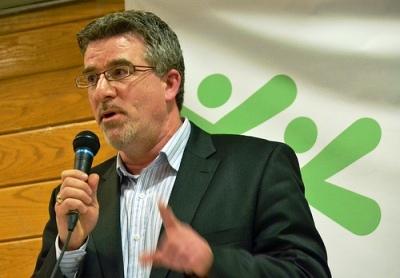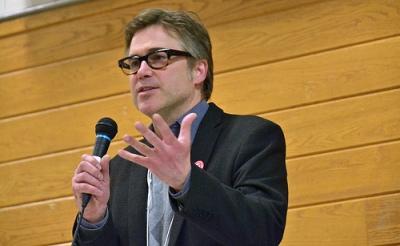
NDP candidate Craig Scott wants to fight against Harper's policies as an opposition MP. Credit: Rob Salerno
Liberal candidate Grant Gordon drew applause for his pledge at an all-candidates debate March 7 that if elected he would tell Prime Minister Stephen Harper to “flick off,” referring to his famous energy-conservation ad campaign with its veiled expletive. Throughout the night, Gordon’s playful and clever pitches to the crowd contrasted sharply with the more staid and policy-focused responses of his chief rival, and the perceived frontrunner, NDP candidate Craig Scott.
The debate, themed on “Supports for Families,” drew about 100 people to Eastview Community Centre March 7, although many appeared to be supporters of the frontrunners.
The Green Party’s Adriana Mugnatto-Hamu pitched to the crowd that electing her as the party’s second MP would have the most impact in Ottawa. Conservative candidate Andrew Keyes did not show up.
At times the debate was most notable for the colourful cast of six independent candidates who proposed various libertarian and redistributive schemes, some of which – including a plan to pay students in bus fare and hydro credits to replace the entire public service – drew laughs from the audience.
Since the winner of the riding is likely to serve in opposition until at least 2015, candidates initially focused on what could be done for the riding while being out of government.
“What happens in Ottawa is important. The opposition can make a difference,” said Scott.
But Gordon indicated his priority would be on community development until the next election.
“We need an MP who can get things done here until we elect a new government in 2015 and do it across the country,” Gordon said.
He drew the first big applause of the night when responding to a question about engaging the riding’s youth. He said he’d like to start a mentorship program and then pointed to people he recognized in the audience, identifying them by their professions and asking if they’d mentor an unemployed youth. They all responded positively.
NDP partisans responded in kind for Scott’s next speech, in response to a question about how the government can pay for new social programs.
“Lowering taxes by Conservatives has not produced job growth or innovation. That’s why the NDP propose targeted breaks to innovators and job creators . . . and lowering small-business taxes,” Scott said.
Scott and Gordon both agreed that the immigration system needs reform.
“Family integration is one of the crying needs of the immigration system now,” Scott said.
Gordon compared Immigration Minister Jason Kenney’s famous campaigning for support from ethnic groups with his department’s cuts to immigrant services in Toronto.
“Jason Kenney is going from restaurant to restaurant and eating a lot, but programs are getting cut,” he said.
Candidates were asked about their support for public transit in the riding, and while all indicated they support city council’s decision to bring back the surface LRT network proposed for the suburbs instead of the mayor’s plan for a single subway line, none said they would push for new spending on transit, including on a proposed new downtown subway line.
Queer issues were not addressed during the debate.
The Toronto-Danforth by-election takes place March 19.


 Why you can trust Xtra
Why you can trust Xtra


